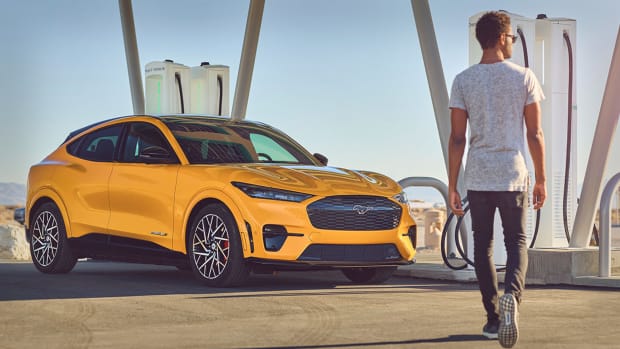The price of almost everything is going up.
This was already the case before Russia invaded Ukraine because the pandemic disrupted supply chains worldwide. But the situation has worsened for the three weeks since the invasion.
Crude oil prices soared, pulling raw materials prices in their wake. Prices for nickel and other key metals for batteries needed by electric vehicles are at very high levels. Russia is responsible for 6% of global aluminum supply and 7% of mined nickel. So a war and sanctions could further constrain global supplies of the metals.
Even if the prices of these materials stabilize in coming weeks, their increase has increased the cost of batteries. And logic would say that the prices of electric vehicles would increase as well.
Elon Musk, chief executive of Tesla (TSLA), summed it up in a recent tweet, which was followed the next day by a major price hike for Tesla cars.
"Tesla & SpaceX are seeing significant recent inflation pressure in raw materials & logistics," Musk wrote to his millions of followers. It was a warning to Tesla and SpaceX customers that prices were about to increase.
Besides Tesla, GM (GM) and Chinese automaker BYD have also hiked the price of their cars, citing soaring costs of raw materials. So one reasonably would expect other automakers to follow suit and protect their profit margins.

Ford
Ford Won't Raise EV Prices Anytime Soon
One manufacturer of electric vehicles, however, will be the exception: Ford (F).
TheStreet contacted the Dearborn, Mich., group to find out whether it, too, plans to raise the prices of its electric vehicles. Ford's response was clear:
"Nothing to add specifically on pricing for now," a spokesperson told TheStreet in an emailed statement.
The spokesperson explained that the automotive group was closely monitoring developments on the pricing front.
"As you’d expect, we’re constantly monitoring and managing volatility in raw material and component availability and prices – like we have been for the past two years," the spokesperson said.
The spokesperson also said that Ford's exposure to raw materials mined or shipped through Russia and Ukraine is limited: "It’s worth noting that we have very limited direct sourcing from Ukraine and Russia."
"However, the situation in Central Europe could exacerbate broader supply chain issues for the industry, including Ford," the spokesperson said.
In addition, the group, led by Chief Executive Jim Farley, one of Wall Street's newer darlings, said it had secured its nickel supply over several months. In the short term that enables Ford not to pass on the surge in nickel prices to customers. Nickel is a key metal in EV batteries.
"We have supplies of nickel contracted through the next few years to support our ambitious EV goals," the company told TheStreet. "Beyond that, we don’t intend to give real-time updates about individual materials and components."
Update to Come in First-Quarter Report
The spokesperson said that on April 27l, when Ford reports first-quarter earnings. it would provide all necessary information on how supply-chain disruptions have affected the automaker and its expectations going forward.
Ford currently markets two electric models: the Mustang Mach-E and the E-Transit all electric commercial van. The firm is due to start production of the long-awaited F-150 Lightning electric pickup soon.
The demand for these three models is very strong, Ford has indicated on different occasions. It is particularly high for some Mach-E variants and also for the F-150 Lightning.
For example, Ford is no longer taking orders for two versions of the Mach-E electric SUV -- the Premium and California Route 1 Mustang models, TheStreet reported on March 7.
Ford is one of the traditional vehicle manufacturers that is accelerating its transition to electrification.
As a sign of the importance of this strategy, the group recently carried out a radical reorganization, creating two distinct divisions: Ford Blue, which now concentrates on gasoline car operations, and Ford e, focused on battery-powered electric vehicles.




.jpg?w=600)


